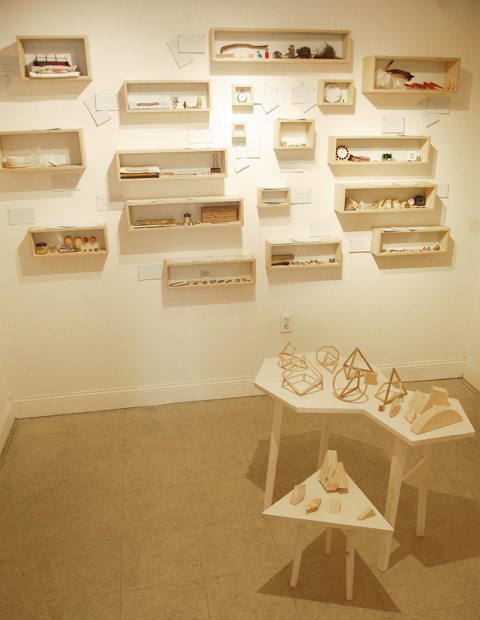
EVERYTHING IN ITS PLACE Part of "The Primers for Naming and Un-Naming of Things" exhibit. [Photo by Greg Cook] |
Underlying “The Primers For the Naming and Un-Naming of Things,” Agata Michalowska and Andrew Oesch’s installation at AS220’s Project Space (95 Mathewson St, Providence, through February 22), are questions about words. How does the language we speak and the ways it orders our world shape how we see things and what we do with them?
The artists have arrayed wooden boxes on one wall as shelves. Inside are precisely stacked and folded tea towels, cups, and silverware, buttons and needles and thread, eggs and fruit pits, a pocket watch, marbles and paint jars and candles. Note cards are tacked around the boxes or laid on top, reading “tune/code/listen,” “encyclopedia,” “books/stories/knowledge,” “too much,” “a home with many nooks/hide,” “hidden/passed on,” “small boxes of clutter and treasure.”
Two small geometric-shaped tables display odd wooden blocks and geometric diagrams made from sticks. Handmade books laid over rods on the wall are printed inside with alphabets and lists of words and vintage pictures of space or images from old children’s books.
Everything is handsomely done and displayed. At first blush, it feels like a sort of like scrapbooking resulting in lots of quiet, wry contemplation. You might grasp that it’s about childhood and collecting and organizing. And delight in the old images. And. . . well, at first, I was uncertain.
By coincidence, Michalowska happened to visit the gallery when I was there. And explained that their inspirations are old children’s primers and alphabet books. “They are the kids’ first introduction to an ordered world,” she told me. The artists are also looking at 19th-century science illustrations. (Michalowska and Oesch are displaying a selection of related vintage texts in cases at the Special Collections of the Providence Public Library, 150 Empire St, through March 31.) The curious geometric shapes on the tables are based on early-childhood teaching objects developed in the 19th century by Friedrich Fröbel, the guy who came up with the idea of kindergarten.
Such references are obscure, and I find myself mentally straining to stretch from what I see in the gallery to the intriguing ideas these smart artists are thinking about.
Michalowska, who grew up in Poland and has lived in Providence for several years, and Oesch, who used to live here but has since decamped to somewhere in New York state, have both worked with children, as a nanny and via kids’ workshops. Contemplating these experiences seem to be part of what’s driving their inquiries.
How does language foster understanding? “We’re also interested in what it takes away from our experiences,” Michalowska said. What possibilities might be closed off because our language can’t even recognize them?
* * *